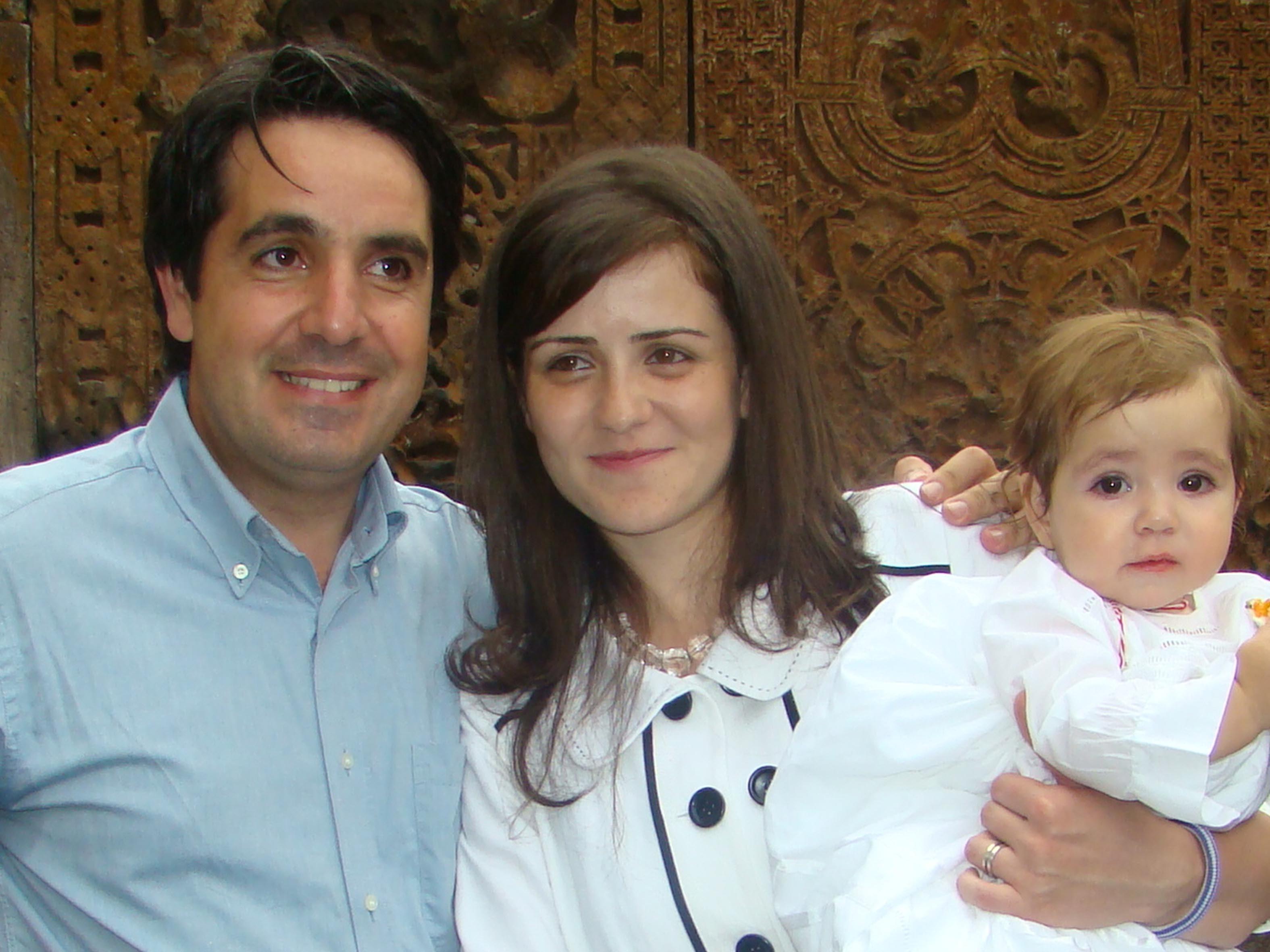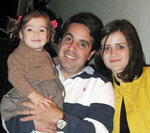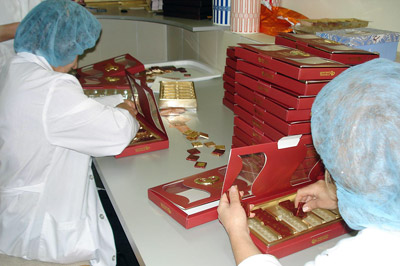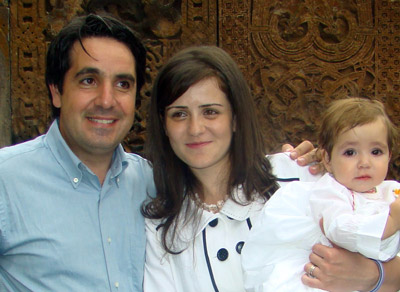
“The Diaspora is Temporary” says Repatriate Tiran Baghdadyan
 Gourmet Chocolate Maker is Out to Break Certain Traditions “Gourmet-Dourmeh” is the name of a chocolate produced in Armenia by Tiran Baghdadyan, a diaspora Armenian who has relocated to Armenia with his family. The term “gourmet” means a tasty morsel, a delicacy, and is used around the world. “Dourm” is the Armenian word for chocolate. You can’t find this chocolate in just any store in Armenia.
Gourmet Chocolate Maker is Out to Break Certain Traditions “Gourmet-Dourmeh” is the name of a chocolate produced in Armenia by Tiran Baghdadyan, a diaspora Armenian who has relocated to Armenia with his family. The term “gourmet” means a tasty morsel, a delicacy, and is used around the world. “Dourm” is the Armenian word for chocolate. You can’t find this chocolate in just any store in Armenia.
Tiran says he doesn’t want to compete with the likes of “Grand Candy”, a leading mass-producer of candy and sweets in Armenia. Tiran says his chocolate is much more “exclusive” and not sold in all stores. “It’s not very expensive, but neither is it very cheap,” he says. Tiran Baghdadyan was born in Lebanon. There were two children in the family, him and his brother Pierre. His parents would always tell the boys that they had to go to Armenia. His father would also remind them that their stay in Lebanon was temporary. The father owned a packing company and would take the boys to the factory to learn how things operated. Back then, the boys were loathed going, but now they are thankful that their father urged them on. They now put into practice the business skills they picked up all those years ago into chocolate making. The boys’ parents sent them to one of the finest schools in Lebanon and they learnt Armenian in the home. When they said “good-bye” instead of the Armenian equivalent “tstesutyun”, their parents would berate them. Tiran remembers learning 2-3 new Armenian words per week and would always ask what this or that Armenian word signified. One day, while fixed on a discussion of chocolate, the father told the boys that the Armenian word was “dourm”. The boys started repeating the word over and over again like some mantra – “dourm”, “dourm”. This is where the concept for “Gourmet Dourm” was first conceived.  When he turned eighteen, Tiran left for Austria to study at the College of Clothing and Design. He opened a clothing shop in Vienna and later closed it upon his return to Lebanon. He says the Armenians in Austria are associated with the Genocide, the Karabakh issue and the 1988 earthquake. In order that Armenians not only be associated with tragic events and suffering, Tiran and his girlfriend at the time, compiled a book, in German, of some 234 famous Armenians from all walks of life. They then distributed copies throughout the country. During the Pan-Armenian Games, Tiran became acquainted with Tamara, an Armenian woman studying at the Bryusov Linguistics Institute in Yerevan. They had sent her to the games as a guide. Tiran was playing for the Lebanese basketball team. To make a long story short, they fell in love at first sight and tied the knot in 2006. “I see a lot of crudeness in many local Armenian men. Tiran wasn’t like that. He really shares much of my way of thinking,” says Tamara. Tiran had a hard time preparing his marriage ceremony. He fought till the end so that cars in the procession wouldn’t honk their horns in the street. “I told them I didn’t want anyone dancing into wedding with skewers of kebab. They kept asking if I was sure of this right till the last minute. I told them to bring in the kebab the same way they do with the salad, otherwise I’d make a big ruckus. They shook their heads in amazement.” “The diaspora is temporary. Here, staying Armenian takes place naturally. There it demands much work and effort. Here, everything is Armenian – the TV, radio, etc. There, you have to constantly tell your kids to speak Armenian. You get so tired doing this; you eventually give up because there are a thousand and one problems involved.” Tiran adds that it’s difficult remaining Armenian overseas. “There’s the problem of identifying with your roots. You don’t know whom you belong to; are you Armenian or Austrian?” Tiran doesn’t like the fact that many in Armenia are slaves to tradition and observes that many things are set in stone here. “It was like this 500 years ago, so that’s the way it has to be today. I am one of those who shatter such concepts. Perhaps 20% of Armenian traditions are worth preserving, but the remaining 80% are not. Someone like me came and wrote down those customs. The people adopted them and became their slaves.”
When he turned eighteen, Tiran left for Austria to study at the College of Clothing and Design. He opened a clothing shop in Vienna and later closed it upon his return to Lebanon. He says the Armenians in Austria are associated with the Genocide, the Karabakh issue and the 1988 earthquake. In order that Armenians not only be associated with tragic events and suffering, Tiran and his girlfriend at the time, compiled a book, in German, of some 234 famous Armenians from all walks of life. They then distributed copies throughout the country. During the Pan-Armenian Games, Tiran became acquainted with Tamara, an Armenian woman studying at the Bryusov Linguistics Institute in Yerevan. They had sent her to the games as a guide. Tiran was playing for the Lebanese basketball team. To make a long story short, they fell in love at first sight and tied the knot in 2006. “I see a lot of crudeness in many local Armenian men. Tiran wasn’t like that. He really shares much of my way of thinking,” says Tamara. Tiran had a hard time preparing his marriage ceremony. He fought till the end so that cars in the procession wouldn’t honk their horns in the street. “I told them I didn’t want anyone dancing into wedding with skewers of kebab. They kept asking if I was sure of this right till the last minute. I told them to bring in the kebab the same way they do with the salad, otherwise I’d make a big ruckus. They shook their heads in amazement.” “The diaspora is temporary. Here, staying Armenian takes place naturally. There it demands much work and effort. Here, everything is Armenian – the TV, radio, etc. There, you have to constantly tell your kids to speak Armenian. You get so tired doing this; you eventually give up because there are a thousand and one problems involved.” Tiran adds that it’s difficult remaining Armenian overseas. “There’s the problem of identifying with your roots. You don’t know whom you belong to; are you Armenian or Austrian?” Tiran doesn’t like the fact that many in Armenia are slaves to tradition and observes that many things are set in stone here. “It was like this 500 years ago, so that’s the way it has to be today. I am one of those who shatter such concepts. Perhaps 20% of Armenian traditions are worth preserving, but the remaining 80% are not. Someone like me came and wrote down those customs. The people adopted them and became their slaves.”  He and his wife have even come up with non-traditional names for their children; combining two names. They named their girl Vanni, a combination of Van and Ani. Their boy was named Arnoy, a cross between Ararat and Noy. Tiran does like one unique Armenian tradition – that of making toasts; the “institution” of the “tamada”; a hybrid of toastmaster and master of ceremonies. He jokingly points out that one tradition he has disposed of is that of bundling the kids in warm clothes. Armenians like to complain Tiran also believes that Armenians are a finicky people who love to complain and that this grumbling affects their work and daily life. He thinks the characteristic stems from the Soviet era. “From the oldest down to the very young, sit down with an Armenian for ten minutes and eight are devoted to voicing complaints. In Armenia, people want to work a day and take off the next seven, especially the males. Women and girls aren’t like that though. No wonder the men are somewhat bewildered in the family setting. They are the center of attention and kings of the castle from early childhood.” Tiran had no expectations of finding a paradise on earth in Armenia, but he’s disappointed that people have left their religion. He says that you can see people wearing large crosses without knowing the true meaning of Christianity. He sees the shortcomings of the Armenian Church in this. Every Sunday, Tiran and the family attend church services; to give thanks to God. He would like to see a clergyman and a church in every corner of Yerevan, where children can go to listen, learn and sing. Instead of finding Armenian clergy, he laments the fact that today one comes across competing sect representatives.
He and his wife have even come up with non-traditional names for their children; combining two names. They named their girl Vanni, a combination of Van and Ani. Their boy was named Arnoy, a cross between Ararat and Noy. Tiran does like one unique Armenian tradition – that of making toasts; the “institution” of the “tamada”; a hybrid of toastmaster and master of ceremonies. He jokingly points out that one tradition he has disposed of is that of bundling the kids in warm clothes. Armenians like to complain Tiran also believes that Armenians are a finicky people who love to complain and that this grumbling affects their work and daily life. He thinks the characteristic stems from the Soviet era. “From the oldest down to the very young, sit down with an Armenian for ten minutes and eight are devoted to voicing complaints. In Armenia, people want to work a day and take off the next seven, especially the males. Women and girls aren’t like that though. No wonder the men are somewhat bewildered in the family setting. They are the center of attention and kings of the castle from early childhood.” Tiran had no expectations of finding a paradise on earth in Armenia, but he’s disappointed that people have left their religion. He says that you can see people wearing large crosses without knowing the true meaning of Christianity. He sees the shortcomings of the Armenian Church in this. Every Sunday, Tiran and the family attend church services; to give thanks to God. He would like to see a clergyman and a church in every corner of Yerevan, where children can go to listen, learn and sing. Instead of finding Armenian clergy, he laments the fact that today one comes across competing sect representatives.  The Armenia Tiran dreams about should be clean, like Europe. His aim is to raise his children as good Armenians – to be industrious, not complain much and honor their promises. Whatever happens, Tiran never plans to leave Armenia even if work problems arise; if life takes on a “non-chocolate or less-chocolate” phase. His brother Pierre organized a going-away party back in Lebanon with the theme “Towards the homeland”. All Tiran’s diaspora Armenian friends were invited. During the festivities Tiran declared his intention to relocate to Armenia with the wife and kids by the end of July. Tiran wished them all the same “good luck”.
The Armenia Tiran dreams about should be clean, like Europe. His aim is to raise his children as good Armenians – to be industrious, not complain much and honor their promises. Whatever happens, Tiran never plans to leave Armenia even if work problems arise; if life takes on a “non-chocolate or less-chocolate” phase. His brother Pierre organized a going-away party back in Lebanon with the theme “Towards the homeland”. All Tiran’s diaspora Armenian friends were invited. During the festivities Tiran declared his intention to relocate to Armenia with the wife and kids by the end of July. Tiran wished them all the same “good luck”.
 Videos
Videos Photos
Photos
Write a comment